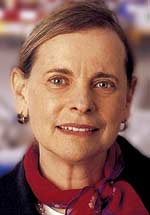Two lecturers, three lectures, and a focus on genes
Next week's Hitchcock and Faculty Research lectures portend a bumper crop of scientific insight
19 March 2009
BERKELEY — This spring's stellar lineup of high-profile campus lectures continues next week, as the second of 2008-09's Faculty Research Lectures, on the topic of genomics, follows close on the heels of the latest Hitchcock Lectures, which offer a distinguished microbiologist's view of threats to global health as well as insights into her pathbreaking research on genetic programming.
On Tuesday, March 31, Stanford microbiologist Lucy Shapiro will deliver the first of two Hitchcock Lectures in her specialty, titled "Emerging Infectious Diseases and Global Health." The following day, April 1, she will speak on "The Systems Architecture of a Bacterial Cell Cycle." Both lectures begin at 4:10 p.m. in the Chevron Auditorium at International House.
 Lucy Shapiro
Lucy ShapiroShapiro is currently the Ludwig Professor of Cancer Research at Stanford's School of Medicine; since 2001 she has served as director of that university's Beckman Center for Molecular and Genetic Medicine. She has been a faculty member at Stanford since 1989, when she was founding chair of the Department of Developmental Biology there. Prior to that date she held faculty and leadership positions at Columbia Uni-versity and the Albert Einstein College of Medi-cine. She is re- -nowned for her contributions to the fields of developmental biology, molecular biology, and genetics.
Her research focuses on the cell cycle of a developing microorganism, particularly on the process by which the cells divide into dissimilar, rather than identical, "daughter" cells. This process is, in Shapiro's words, "one of the most fundamental questions of developmental biology." Shapiro's pioneering work has revealed the genetic circuitry controlling a bacterial cell with 3,767 genes, providing the basic principles of genetic programming that help cells move seamlessly through the cell cycle.
An illuminator and a scholar
Berkeley's own Michael Levine, professor of genetics, genomics, and development, delivers this year's second Faculty Research Lecture on Thursday, April 2, from 5 to 6 p.m. at International House. (For an account of this year's first Faculty Research Lecture, presented last week, see page 8.) His topic will be "The Invisible Genome: How Regulatory DNAs Control Animal Development and Evolution."
Levine, a leader in the area of developmental gene regulation, has — in the words of Professor Judith Butler, who chaired the committee that selected this year's faculty lecturers — "illuminated the mechanisms controlling cell and tissue identity, spatial patterning of gene expression, and certain codes in genome sequences in several kinds of organisms." Calling him "clearly one of the foremost scholars of the life sciences on the Berkeley campus," Butler spoke for her committee in asserting that Levine is "widely respected by his peers for the rigor, insight, clarity, and unsurpassed quality of his work."
In addition to serving as co-director of the campus Center for Integrative Genomics, Levine is a fellow of the American Academy of Arts and Sciences, a member of the National Academy of Sciences, and the recipient of several high-profile awards. Among his numerous honors and distinctions, he was recruited by Nobel laureate James Watson to serve as co-author of the classic undergraduate textbook The Molecular Biology of the Gene, now in its sixth edition.
The two Hitchcock Lectures and the Faculty Research Lecture are all free and open to the public.

